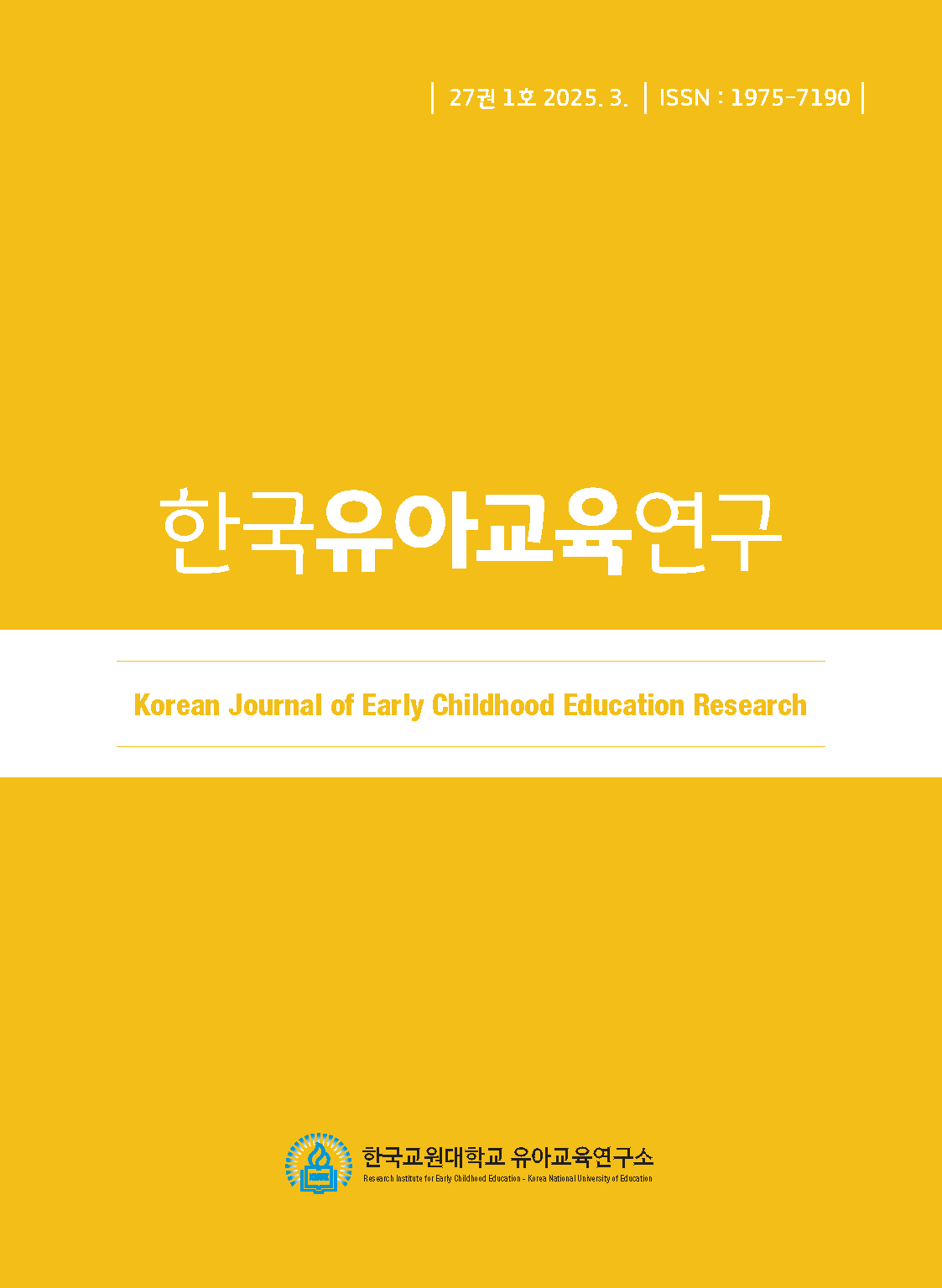유치원 교사의 교육에 대한 이미지 분석
Image analysis of kindergarten teachers' perceptions of education
- 한국교원대학교 유아교육연구소
- 한국유아교육연구
- 제27권 제2호
-
2025.06248 - 279 (32 pages)
-
DOI : 10.15409/riece.2025.27.10
- 12

본 연구는 이미지 분석을 통해 유치원 교사의 교육 인식을 유형화하고, 그 의미를 탐색하는 데 목적이 있다. 연구자가 임의표집한 유치원 교사 152명을 대상으로 그림 그리기와 그림 설명 설문지를 배부⋅ 회수한 후, 시각적 근거이론 방법으로 유형의 범주화 및 의미분석을 하고, 유형별 빈도와 백분율을 산출하였 다. 연구 결과, 첫째, 교육에 대한 인식유형은 ‘교육과정 실천’, ‘구성원의 변화와 성장’, ‘존중과 관계 형성’, ‘환경적 지원’, ‘우리 삶의 일부’, ‘학교 제도와 운영’의 여섯 가지로 나타났으며, 이에 따른 세부 범주는 ‘가르침’, ‘다양한 교수 방법’, ‘학습자의 성장’, ‘모두의 성장’, ‘물리적 환경’, ‘인적 환경의 교사’로 도출되었 다. 둘째, 인식유형의 의미분석을 통해 교사의 교수 행위, 교육의 지향성, 구성원 간 관계, 교육환경의 역할, 삶과 얽힌 교육의 본질, 교육제도의 기능 등 다양한 관점에서 교육에 대한 인식이 드러남을 확인하였다. 다수의 교사는 교육을 교수 행위 중심으로 인식하고 있었으며, 이는 교육과정 실행자로서의 교사의 역할에 대한 성찰과 자기반성적 접근의 필요성을 시사한다. 또한, 교육에 대한 인식이 고정되거나 편향되지 않도록, 교사는 자신의 교육 가치관을 비판적으로 성찰하고, 교육적 상황에 따라 유연하게 가치관을 형성해 나갈 수 있어야 한다. 이를 위해 교육의 다양한 관점에 대한 이해와 지속적인 고찰이 필요함을 제안한다.
This study aims to categorize and explore the meanings of kindergarten teachers’ perceptions of education through image analysis. A total of 152 kindergarten teachers were selected via convenience sampling and asked to draw an image representing education and provide a written explanation. Using visual grounded theory, the collected data were categorized, analyzed, and quantified by frequency and percentage. The results revealed six major perception types: “curriculum practice,” “growth and development of members,” “respect and relationship building,” “environmental support,” “a part of life,” and “school system and operation.” Subcategories included teaching, diverse instructional methods, learners’ growth, shared growth, physical environment, and the teacher as human resource. The analysis showed that teachers perceive education from various perspectives including instructional practices, educational goals, relationships among participants, the role of the environment, the essence of education as intertwined with life, and the function of the education system. Many teachers perceived education primarily as an instructional practice, which suggests the need for reflection and a self-reflective approach regarding the teacher's role as a curriculum implementer. In addition, to prevent educational perceptions from becoming fixed or biased, teachers should critically reflect on their own educational values and be able to flexibly shape these values according to educational contexts. This study suggests the importance of understanding various perspectives on education and engaging in continuous reflection.
Ⅰ. 서론
Ⅱ. 연구 방법
Ⅲ. 연구 결과
Ⅳ. 논의 및 제언
참고문헌
(0)
(0)